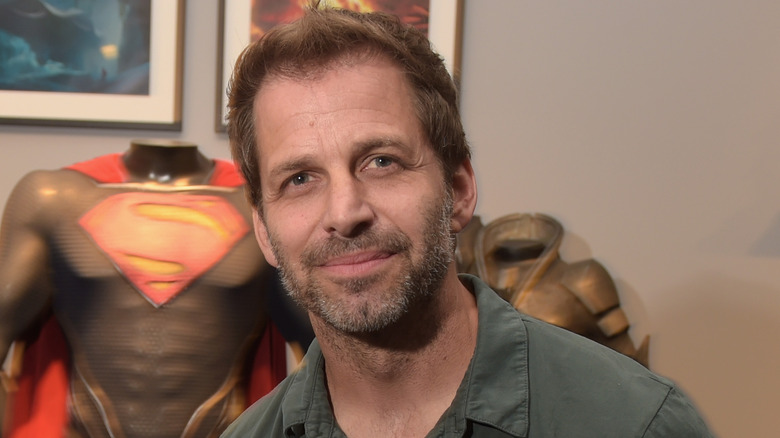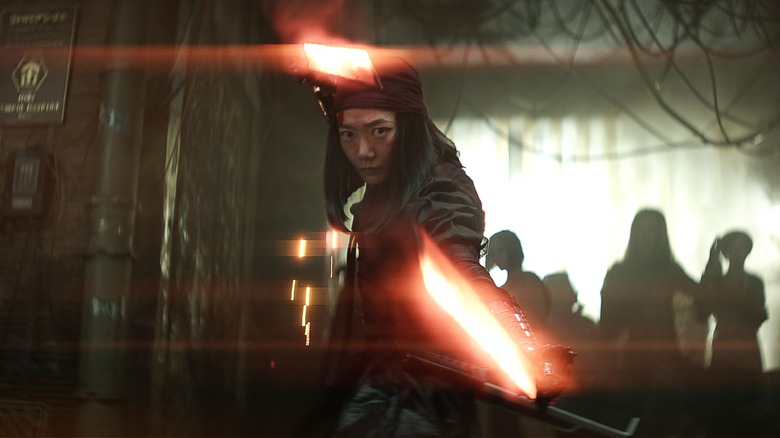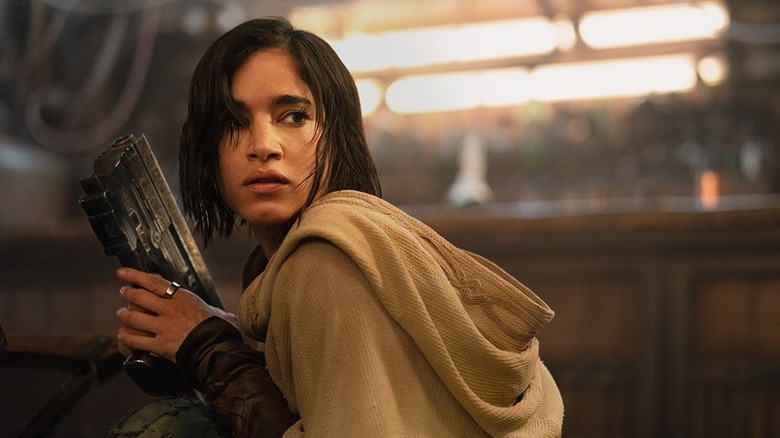Zack Snyder Admits Why He Left A Little Star Wars DNA In Rebel Moon - Exclusive Interview
After Disney purchased Lucasfilm in 2012, acclaimed writer-director Zack Snyder put a story idea out to the "Star Wars" universe that he hoped would fit into the framework of the legendary franchise. But when Snyder's "Star Wars" bid fell short, the filmmaker didn't ground his idea. Instead, he set himself free from the constraints of the franchise with an original story that became "Rebel Moon."
As such, the film, which is playing in theaters in limited release and debuts exclusively on Netflix on the evening of December 21, is the beginning of a new franchise for Snyder. Officially titled "Rebel Moon – Part One: A Child of Fire" — to be followed by "Rebel Moon – Part Two: The Scargiver" in April 2024 — the story introduces Kora (Sofia Boutella), a mysterious resident of a farming settlement on the moon of Veldt, which is located on the edge of the universe.
Kora leads a peaceful life in her adopted environs until a menacing group from the militaristic planet known as the Motherworld lands on Veldt with the intention of seizing most of the settlement's crop supply. Sent by the Motherworld's dictator to impose rule, Admiral Noble (Ed Skrein) immediately subjects Veldt's residents to a tyrannical rule, with the threat of looming starvation and the brutalization of the settlement's population.
Already shocked by the insurgency, a violent incident causes Kora to snap and fight back against the moon's aggressors, sparking her to form a group of rebels to fight back against the Motherworld or die without hope. By emerging from the shadows, however, Kora becomes vulnerable to having the dark secrets of her past exposed.
In an exclusive interview with Looper, Snyder discussed the origin of "Rebel Moon: Part One – A Child of Fire," the continuing influence of his "Man of Steel" collaborator Christopher Nolan on his career and the film, and more.
Snyder says remants of his Star Wars story remain in Rebel Moon
Being that "Rebel Moon" originated as a "Star Wars" story, were there any times after that — during the screenwriting process or maybe during production — when you had to step back and say, "That reminds me too much of 'Star Wars'; let's do it again. I want to stick to and maintain the integrity of this original story"?
A little bit, but mostly what it allowed is that any of the "Star Wars" iconology that you might see in the movie now that's left over is there by design. In the end, I can't help myself 100% from being a slight deconstructivist and taking a subversive look at the overall science fiction landscape or the sort of pantheon of mythology that we accept as our cinematic touchstones.
I don't mind poking at them a little bit from time to time because it's always important work. We've analyzed it enough to where if there's anything that reminds you of "Star Wars," it's there on purpose.
Snyder explains Kora's quest for kindness amid the battle
In every great film — yes, you have all that big spectacle, but you also have to have emotion. Everything is grounded in real emotion in "Rebel Moon" because even amongst the battles and the sacrifices, it's all happening in the quest for peace. With that, I was particularly struck by the line from Kora when she says, "Kindness is a virtue worth dying for." I'm wondering what inspired that line.
Kora's character was a character that was born of ... She's a child of war; she's a warrior. She solves a lot of her problems with violence, and her exposure to this child — who is a child — [in a scene early in the movie, she] expressed kindness on a supernatural and pure level [that] changed her. She felt the difference between being aggressive with aggression as your primary motivator and kindness as your primary motivator. For her, it was a revelation, and that was a thing that I felt intuitively — that as a need for a society or for a movement or for a group of people. That was one of the most important ingredients to make them righteous.
Snyder continues to be inspired by Nolan
I've read recently how you feel Christopher Nolan's "Oppenheimer" is your favorite film of the year, and Chris has certainly been complimentary of his work with you on "Man of Steel." I'm wondering how influential has Chris been since that point. Was there anything that you implemented in "Rebel Moon" that was born of your work with Chris?
Chris' main influence on me is his singularity, his singular vision, [his] uncompromising, straight-ahead approach to filmmaking ... He feels it's very singular, very of one voice, which I love in movies. I love it when a director ... I think of people like David Fincher and Chris, for example, who are very like, "We live in a great age of really gifted and amazing auteurs that can transport you to another point of view." In the end, movies are being transported to another point of view, and I happen to think his is pretty cool.
Well, Zack, great talking with you again. I have to put you on the spot quickly: Leonidas [Gerard Butler] from "300" versus Kora in "Rebel Moon." They're both ass-kickers. When you throw them in the ring, who wins?
Oh, geez. That's a pretty tough one. It depends. No weapons?
No weapons.
Yeah, that's a tough one. Kora might stand a chance because of her ... She has a much more modern warrior aesthetic, so she might have some techniques that Leonidas just doesn't have. He's more of a brawler.
Also starring Charlie Hunnam, Djimon Hounsou, Doona Bae, Michiel Huisman, Ray Fisher, Cleopatra Coleman, Staz Nair, and E. Duffy, "Rebel Moon – Part One: A Child of Fire" is playing in theaters in limited release and debuts exclusively on Netflix the evening of December 21.
This interview has been edited for clarity.



